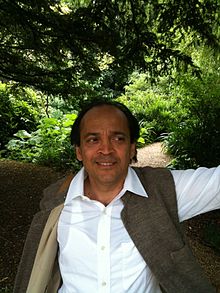Vikram Seth
Indian novelist and poet
Vikram Seth (born 20 June 1952) is an Indian poet and author.

- See also:
- A Suitable Boy (1993)
Quotes
edit- Some men like Jack and some like Jill
I'm glad I like them both but still
I wonder if this freewheeling
Really is an enlightened thing,
Or is its greater scope a sign
Of deviance from some party line?
In the strict ranks of Gay and Straight
What is my status: Stray? Or Great?
- "Dubious", Mappings (Calcutta: Writers Workshop, 1980) [1]
- Imagining the flower-pot attacked it
The kitten flung the violets near and far
And yet, who knows? This morning, as I backed it,
My car was set upon by a parked car.
- "Malefic Things", All You Who Sleep Tonight (Viking/Penguin India, 1990)
- All you who sleep tonight
Far from the ones you love,
No hands to left or right,
And emptiness above— Know that you aren’t alone.
The whole world shares your tears,
Some for two nights or one,
And some for all their years.- All You Who Sleep Tonight (New York: Alfred A. Knopf, 1990), title poem
A Suitable Boy (1993)
edit- These are just a few sample quotes; for more quotes from this work see A Suitable Boy
- 'You too will marry a boy I choose,' said Mrs Rupa Mehra firmly to her younger daughter. Lata avoided the maternal imperative by looking around the great lamp-lit garden of Prem Nivas. The wedding-guests were gathered on the lawn. 'Hmm,' she said. This annoyed her mother further.
Quotes about Vikram Seth
edit- He writes with the omniscience and authority of a large, orderly committee of experts on Indian politics, law, medicine, crowd psychology, urban and rural social customs, dress, cuisine, horticulture, funerary rites, cricket and even the technicalities of shoe manufacture.
- Vikram Seth (1993). A Suitable Boy. Penguin Books India. p. 1. ISBN 978-0-14-023033-8.
- Vikram Seth's book A Suitable Boy (1993) that made history as a publishing phenomenon heralded the change from an economist-poet to a full-time writer, making millions in pounds. The media dwelt on its 700,000 words and 1,349 pages, the longest novel published in England since Richardson's Clarissa (1744-48) and longer than Tolstoy's War and Peace (1865-69) — and on Seth's advance of more than 2 million pounds. More relevant are the artistic comparisons made to Jane Austen, George Eliot, Tolstoy and Dickens.
- Seemita Mohanty (2007). A Critical Analysis of Vikram Seth's Poetry and Fiction. Atlantic Publishers & Dist. p. 159. ISBN 978-81-269-0831-8.
- A Suitable Boy (which burlesques poetic pretensions) reads like the offspring of an unlikely mating of Jane Austen and Leo Tolstoy, with its father's looks and mother's temperament.
- Jaina C. Sanga (2003). South Asian Novelists in English: An A-to-Z Guide. Greenwood Publishing Group. p. 252. ISBN 978-0-313-31885-6.
- In A Suitable Boy, Seth's traditionalism allows him to rediscover character. Mrs Rupa Mehra becomes too substantial, too vivid a presence to be confined within a novel: she is at once infuriating and endearing, a benevolent Indian version of Mrs Bennet in Pride and Prejudice, a comparison that Seth is typically careful to suggest by equipping her daughter with a Jane Austen novel to read on a train.
- John Sturrock (1997). The Oxford Guide to Contemporary World Literature. Oxford University Press. p. 219. ISBN 978-0-19-283318-1.
- Like Midnight's Children, however, A Suitable Boy too is steeped in an awareness of and affection for indigenous literary and cultural traditions, most notably Urdu poetry, Hindustani classical music, the performed Ramayana, the Ramlila, Shia marsiyas or lamentations, Tagore's songs ('Rabindra Sangeet'), and, of course, Hindi cinema.
- Priyamvada Gopal (29 January 2009). The Indian English Novel: Nation, History, and Narration. Oxford University Press. p. 106. ISBN 978-0-19-954438-7.
- The diversity and range of Seth's work makes him somewhat of an enigma. However, for a writer who counts such diverse figures as Pushkin, T'ang dynasty Chinese poets, Chaucer, the Elizabethans, Tennyson, novelists like Hardy, Austen, George Eliot, R. K. Narayan, and modern poets like Timothy Steele and Philip Larkin among some of his literary influences, Seth's wide-ranging technique is conceivably not so surprising.
- Roopali Gupta (1 January 2005). Vikram Seth's Art: An Appraisal. Atlantic Publishers & Dist. p. 6. ISBN 978-81-269-0550-8.
- In portraying a domestic life constrained, disrupted, and transformed by civil violence, Seth draws on the nineteenth-century historical novels of Scott, Alessandro Manzoni, Theodore Fontane, and Leo Tolstoy.
- Claudia L. Johnson; Clara Tuite (13 October 2011). A Companion to Jane Austen. John Wiley & Sons. p. 472. ISBN 978-1-4443-5490-4.